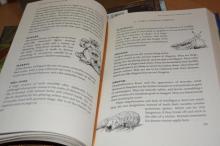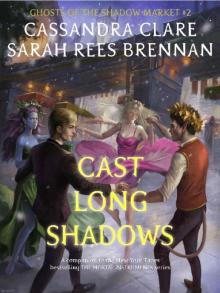- Home
- Cassandra Clare
The Runaway Queen Page 3
The Runaway Queen Read online
Page 3
And there she was—Queen Marie Antoinette. He’d seen her image many times, but now she was in front of him, and altogether human. That was the shock of it. The queen was a human, in her sleeping dress. There was a loveliness about her. One part, no doubt, was simply the training she had had—her regal bearing and small, delicate footsteps. The pictures had never done justice to her eyes, though, which were large and luminous. Her hair had been carefully coiffed in a halo of light curls, over which she wore a light linen cap. Magnus remained in the shadows and watched her pace her room, going from bed to window and back to bed again, clearly terrified about the fate of her family.
“You notice nothing, madame,” he said quietly. The queen turned as he said this and looked at the corner of the room in confusion, then returned to her pacing. Magnus drew closer, and as he did so, he could see how the strain of things had taken its toll on the woman. Her hair was thin, and pale, turning brittle and gray at points. Still, her face had a fierce, determined glow that Magnus quite admired. He could see why Axel felt for her—there was a strength there he never would have expected.
He wiggled his fingers, and blue flames crackled between them. Again the queen turned in confusion. Magnus passed his hand by her face, changing her visage from the familiar and royal to the familiar and ordinary. Her eyes diminished in size and grew dark, her cheeks became plumper and heavily flushed with red, her nose increased in size, and her chin receded. Her hair became more limp and darkened to a chestnut brown. He went a little further than was absolutely necessary, even altering her cheekbones and ears a bit until no one could mistake the woman in front of him for the queen. She looked as she was supposed to look—like a Russian noblewoman of a different age, a different life altogether.
He created a noise near the window to draw her attention away, and when her back was turned, he exited. He left the palace through a heavily trafficked exit behind the royal apartments, where the queen kept a gate open for Axel’s nightly entrances and exits.
It was altogether simple and elegant, and a good night’s work. Magnus smiled to himself, looked up at the moon hanging over Paris, and thought of Axel, driving around in his coach. Then he thought of Axel doing other things. And then he hurried on. There were vampires to see.
It was a fortunate thing that vampire parties always started so late. Magnus’s carriage drew up to Saint Cloud’s door after midnight. The footmen, all vampires, helped him from his carriage, and Henri greeted him by the door.
“Monsieur Bane,” he said, with his creepy little smile. “Master will be so very pleased.”
“I’m so glad,” Magnus said, barely concealing his sarcasm. Henri’s eyebrow flicked just a bit. Then he turned and put his arm out to a girl of similar age and appearance—blond, glassy-eyed, dull of expression, and very beautiful.
“You know my sister, Brigitte?”
“Of course. We’ve met several times, mademoiselle, in your . . . previous life.”
“My previous life,” Brigitte said with a little, tinkling laugh. “My previous life.”
Brigitte’s previous life was an idea that continued to entertain her, as she kept giggling and smiling to herself. Henri put his arm around her in a way that was not entirely brotherly.
“Master has very generously allowed us to keep our names,” he said. “And I was most pleased when he permitted me to return to my former home and bring my sister back here to live. Master is most generous in this way, as he is in all ways.”
This caused Brigitte to have another fit of giggles. Henri gave her a playful pat on the bottom.
“I’m absolutely parched,” Magnus said. “I think I’ll find some champagne.”
Unlike the dreary and poorly lit Tuileries, Saint Cloud’s house was spectacular. It didn’t quite qualify as a palace, in terms of size, but it had all of the opulence of the décor. It was a veritable jungle of patterns, with paintings packed frame to frame up to the ceilings. And all of Saint Cloud’s chandeliers sparkled and were full of black candles, dripping black wax onto the floor. The wax was then instantly scraped up by a small army of darklings. A few mundane hangers-on were draped over the furniture, most holding wineglasses—or bottles. Most slumped with their necks exposed, just waiting, begging to be bitten. The vampires stayed on their own side of the room, laughing amongst themselves and pointing, as if choosing what to eat from a table laden with delicacies.
In mundane Parisian society the large powdered wig had recently gone out of fashion, in favor of more natural styles. In vampire society the wigs were bigger than ever. One female vampire wore a wig that was at least six feet high, powdered a light pink, and supported by a delicate latticework of what Magnus suspected was the bones of children. She had a bit of blood at the corner of her mouth, and Magnus could not figure out if the slashes of red on her cheeks were blood or extreme streaks of blush. (Like the wigs, the Paris vampires also favored the slightly passé makeup styles, such as the sharp spots of blush on the cheeks, possibly in mockery of the humans.)
He passed an ashen-faced harpist who had—Magnus noted grimly—been shackled to the floor by his ankle. If he played well enough, he might be kept alive for a while to play again. Or he could be a late-night snack. Magnus was tempted to sever the harpist’s chain, but just at that moment there was a voice from above.
“Magnus! Magnus Bane, where have you been?”
Marcel Saint Cloud was leaning over the rail and waving down. Around him, a cluster of vampires peered at Magnus over their fans of feather and ivory and bone.
Saint Cloud was, though it pained Magnus to admit it, strikingly beautiful. The old ones all had a very special look about them—a luster that came with age. And Saint Cloud was old, possibly one of Vlad’s very first vampire court. He was not as tall as Magnus, but was very finely boned, with jutting cheekbones and long fingers. His eyes were utterly black, but caught the light like mirrored glass. And his clothes . . . well, he used the same tailor as Magnus, so of course they were wonderful.
“Always busy,” Magnus said, managing a smile as Saint Cloud and his cluster of followers descended the steps. They clung to his heels, altering their pace to fall in line with his. Sycophants.
“You’ve just missed de Sade.”
“What a shame,” Magnus replied. The Marquis de Sade was a decidedly eerie mundane, with the most perverse imagination Magnus had ever come across since the Spanish Inquisition.
“There are some things I want to show you,” Saint Cloud said, putting a cold arm around Magnus’s shoulders. “Absolutely wonderful things!”
One thing Saint Cloud and Magnus had in common was a rich appreciation for mundane fashion, furniture, and art. Magnus tended to buy his, or receive them as payment. Marcel traded with the revolutionaries—or with the street people who had raided great houses and taken the pretty things from inside. Or his darklings handed over their possessions. Or things just arrived in his house. It was best not to ask too many questions but simply to admire, and admire loudly. Marcel would take offense if Magnus didn’t praise every item.
Suddenly, a chorus of voices from an outside courtyard was calling for Saint Cloud.
“Something seems to be going on,” Marcel said. “Perhaps we should investigate.”
The voices were high, excited, and giddy—all tones Magnus didn’t want to hear at a vampire party. Those tones meant very bad things.
“What is it, my friends?” Marcel said, walking toward the front hall.
There was a tangle of vampires standing at the foot of the front steps, with Henri at the head. A few of them were holding a struggling figure. She made high-pitched squeals from a mouth that sounded covered, though it was impossible to see her in the throng.
“Master . . .” Henri’s eyes were wide. “Master, we have found . . . You will not believe, Master . . .”
“Show me. Bring it forward. What is it?”
The vampires ordered themselves a bit and threw the human into the cleared space on the ground. It was all M
agnus could do not to make a sound of alarm, or give away anything at all.
It was Marie Antoinette.
Of course, the glamour he had applied did not affect the vampires. The queen was exposed, her face white with shock.
“You . . . ,” she said, addressing the crowd in a shaky voice, “what you have done . . . You will—”
Marcel raised a silencing hand, and to Magnus’s surprise, the queen stopped speaking.
“Who brought her?” he asked. “How did this happen?”
“It was I, monsieur,” said a voice. A dapper vampire named Coselle stepped to the front. “I was on my way here, coming down the rue du Bac, and I absolutely could not believe my eyes. She must have gotten out of the Tuileries. She was just on the street, monsieur, looking panicked and lost.”
Of course. The queen would not have been accustomed to being out on the streets on her own. And in the dark it was easy to go the wrong way. She had made a wrong turn and crossed the Seine somehow.
“Madame,” Marcel said, walking down the stairs. “Or should I say ‘Your Majesty’? Do I have the pleasure of addressing our beloved and most . . . illustrious queen?”
A low snicker from around the room, but aside from that no noise at all.
“I am she,” the queen said, rising to her feet. “And I demand—”
Marcel put up his hand again, indicating silence. He descended the rest of the steps and walked to the queen, stood in front of her, and examined her closely. Then he gave a small bow.
“Your Majesty,” he said. “I am thrilled beyond words that you could attend my party. We are all thrilled beyond words, are we not, my friends?”
By now, all the vampires who could fit had crowded into the doorway. Those who could not were leaning out of the windows. There were nods and smiles, but no reply. The silence was terrible. Outside Marcel’s courtyard wall, even Paris itself seemed to have fallen silent.
“My dear Marcel,” Magnus said, forcing a laugh. “I do hate to disappoint you, but this is not the queen. This is the mistress of one of my clients. Her name is Josette.”
As this statement appeared to be plainly and glaringly false, Marcel and the others remained silent, waiting to hear more. Magnus walked down the steps, trying to look like he was amused by this turn of events.
“She’s very good, isn’t she?” he said. “I cater to many tastes, much like you. And I happen to have a client who wishes to do to the queen what she has been doing to the French people for many years. I was hired to do a complete transformation. And I must say, at the risk of sounding immodest, that I have done an excellent job of it.”
“I have never known you to be modest,” Marcel said without a hint of a smile.
“It’s an overrated quality,” Magnus replied with a shrug.
“Then how do you explain the fact that this woman claims she is, in fact, Queen Marie Antoinette?”
“I am the queen, you monster!” she said, her voice now hysterical. “I am the queen. I am the queen!”
Magnus got the impression that she was saying this not as a way of impressing her captors but as a way of assuring herself of her own identity and sanity. He stepped calmly in front of her and snapped his fingers in front of her face. She fell unconscious at once, slumping gently into his arms. “Why,” he said, calmly turning toward Marcel, “would the queen of France be wandering down this street, unattended, in the middle of the night?”
“A fair question.”
“Because she wasn’t. Josette was. She had to be complete in every way. At first my client wanted her only to look like the queen, but then he insisted on the entire package, as it were. Appearance, personality, all of it. Josette absolutely believes she is Marie Antoinette. In fact, I was doing a bit of work on her in this very regard when she became afeared and escaped from my apartments. Perhaps she followed me here. Sometimes my talents get the better of me.”
He set the queen gently on the ground.
“It also appears she has a light glamour on her,” Marcel added.
“For mundanes,” Magnus said. “You can’t have a woman who looks exactly like the queen passing through the streets. It’s quite a light one, like a summer shawl. She was not supposed to leave the house. I was still working.”
Marcel squatted down and took the queen’s face in his hand, turning it from side to side, sometimes looking at the face itself, sometimes at the neck. A long minute or two passed in which the entire assembled group waited for his next utterance.
“Well,” Marcel said at last, standing back up. “I must congratulate you on an excellent piece of work.”
Magnus had to brace himself in order that his sigh of relief would not be seen.
“All of my work is excellent, but I accept your congratulations,” he said, flicking a careless hand in Marcel’s direction.
“A marvel such as this, it would be such a success at one of my gatherings. So I really must insist that you sell her to me.”
“Sell her?” Magnus said.
“Yes.” Marcel leaned down and traced his finger down the queen’s jawline. “Yes, you must. Whatever your client paid you, I’ll double it. But I really must have her. Quite stunning. Whatever you like, I will pay.”
“But, Marcel . . .”
“Now, now, Magnus.” Marcel slowly waggled a finger. “We all have our weaknesses, and our weaknesses must be indulged if they are to flourish. I will have her.”
It wouldn’t do to imply that this fictional client was more important than Marcel.
Think. He had to think. And he knew that Marcel was watching him think. “If you insist,” Magnus replied. “But, as I said, I was still working. I just had a few finishing touches left to do. She still has a few unfortunate habits left over from her previous life. All of those Versailles mannerisms—there are so many of them—they all had to be stitched in like fine embroidery. And I hadn’t yet signed the work. I do like to sign my work.”
“How long would this take?”
“Oh, not long at all. I could bring her back tomorrow . . .”
“I would prefer she stayed here. After all, how long does it take you to sign your work?” Marcel asked with a light smile.
“It can take time,” Magnus said, responding with his own knowing smile. “I have an exquisite signature.”
“While I deal in used goods, I do prefer ones in pristine condition. Don’t be long about it. Henri, Charles . . . take Madam upstairs and put her in the blue room. Let Monsieur Bane complete his signature. We are looking forward to seeing the final product shortly.”
“Of course,” Magnus said.
Slowly he followed the prostrate queen and the darklings back inside.
After Henri and Charles put the queen on the bed, Magnus locked the door and slid a large wardrobe to block it. Then he threw open the shutters. The blue room was a third-floor room, a sheer drop down to the receiving courtyard. That was the only way out.
Magnus allowed himself a few moments of swearing before shaking his head and taking stock of his situation again. He could probably get himself out of this, but to get both himself and the queen . . . and to return the queen to Axel . . .
He looked out the window again, to the ground below. Most of the vampires had gone back inside. A few servants and darklings remained to greet the carriages, though. Down would not work, but up . . .
Up, in a balloon, for instance.
Magnus was certain of one thing—this work was going to be very difficult. The balloon itself was on the other side of Paris. He reached out with his mind and found what he was looking for. It was rolled up still, in the gazebo in the Bois de Boulogne. He rolled it to the grass, he willed it to inflate, glamoured it invisible, and then he lifted it from the ground. He felt it lift, and he guided it up, over the trees of the park, over the houses and the streets, carefully avoiding the spires of the churches and cathedrals, over the river. It was strongly buoyant and was pulled easily by the wind. It wanted to go straight up into the sky, but Magnus
held on.
At some point he would run dry of power, and then he would lose consciousness. He could only hope that this would happen late enough in the process, but there was really no telling. As the balloon drew nearer, he did his best to glamour it completely, making it invisible to even the vampires just below. He watched it come to the window, and as carefully as he could, he guided it close. He leaned out as far as he could and caught hold of it. The basket had a small door, which he managed to get open.
When one steals a flying balloon and animates it to fly over Paris, one should, ideally, have some idea how said balloon normally works. Magnus had never been interested in the mechanics of the balloon—his only interest was that the mundanes could now fly in a colorful piece of silk. So when he discovered that the basket contained a fire, he was dismayed.
Also, the queen herself was probably not heavy, but her dress—and whatever she had concealed or sewn into the dress for her escape—certainly was, and Magnus had no energy to spare. He snapped his fingers, and the queen woke. Just in time he drew a finger across her lips and silenced the scream that was about to come from her mouth.
“Your Majesty,” he said, the exhaustion weighing his voice. “There is no time to explain, and no time for introductions. What I need you to do is—as quickly as possible—step out of that window. You cannot see it, but there is something out there that will catch you. But we must be quick.”
The queen opened her mouth and, finding that she could not speak, began to run around the room, picking up objects and hurling them at Magnus. Magnus cringed as vases hit the wall next to him. He managed to lash the balloon to the window with the curtain and grabbed the queen. She began to pummel Magnus. Her fists were small and she was clearly unused to this sort of activity, but her blows were not entirely ineffective. He had very little strength left, and she seemed to be running on raw fear, which quicksilvered her veins.
“Your Majesty,” he hissed. “You must stop. You must listen to me. Axel—”

 The Midnight Heir
The Midnight Heir Son of the Dawn
Son of the Dawn Angels Twice Descending
Angels Twice Descending City of Bones
City of Bones Vampires, Scones, and Edmund Herondale
Vampires, Scones, and Edmund Herondale Bitter of Tongue
Bitter of Tongue What Really Happened in Peru
What Really Happened in Peru Shadowhunters and Downworlders
Shadowhunters and Downworlders Learn About Loss
Learn About Loss What to Buy the Shadowhunter Who Has Everything
What to Buy the Shadowhunter Who Has Everything Welcome to Shadowhunter Academy
Welcome to Shadowhunter Academy Nothing but Shadows
Nothing but Shadows Clockwork Prince
Clockwork Prince The Fiery Trial
The Fiery Trial City of Glass
City of Glass Clockwork Angel
Clockwork Angel City of Heavenly Fire
City of Heavenly Fire The Rise of the Hotel Dumort
The Rise of the Hotel Dumort The Shadowhunters Codex
The Shadowhunters Codex Cast Long Shadows
Cast Long Shadows City of Lost Souls
City of Lost Souls Lady Midnight
Lady Midnight Lord of Shadows
Lord of Shadows The Whitechapel Fiend
The Whitechapel Fiend City of Fallen Angels
City of Fallen Angels Clockwork Princess
Clockwork Princess Queen of Air and Darkness
Queen of Air and Darkness Saving Raphael Santiago
Saving Raphael Santiago The Red Scrolls of Magic
The Red Scrolls of Magic City of Ashes
City of Ashes Pale Kings and Princes
Pale Kings and Princes The Runaway Queen
The Runaway Queen The Last Stand of the New York Institute
The Last Stand of the New York Institute A Long Conversation (The Shadowhunter Chronicles)
A Long Conversation (The Shadowhunter Chronicles) The Lost Book of the White
The Lost Book of the White Chain of Gold
Chain of Gold The Fall of the Hotel Dumort
The Fall of the Hotel Dumort Born to Endless Night
Born to Endless Night The Lost Herondale
The Lost Herondale An Illustrated History of Notable Shadowhunters & Denizens of Downworld
An Illustrated History of Notable Shadowhunters & Denizens of Downworld Ghosts of the Shadow Market
Ghosts of the Shadow Market Through Blood, Through Fire
Through Blood, Through Fire Every Exquisite Thing
Every Exquisite Thing City of Fallen Angels mi-4
City of Fallen Angels mi-4 The Land I Lost (Ghosts of the Shadow Market Book 7)
The Land I Lost (Ghosts of the Shadow Market Book 7) Queen of Air and Darkness (The Dark Artifices #3)
Queen of Air and Darkness (The Dark Artifices #3) The Wicked Ones (Ghosts of the Shadow Market Book 6)
The Wicked Ones (Ghosts of the Shadow Market Book 6) The Wicked Ones
The Wicked Ones A Deeper Love
A Deeper Love City of Fallen Angels (4)
City of Fallen Angels (4) The Evil We Love (Tales from the Shadowhunter Academy Book 5)
The Evil We Love (Tales from the Shadowhunter Academy Book 5) Vampires, Scones, and Edmund Herondale tbc-3
Vampires, Scones, and Edmund Herondale tbc-3 City of Glass mi-3
City of Glass mi-3 Tales from the Shadowhunter Academy
Tales from the Shadowhunter Academy The Infernal Devices Series
The Infernal Devices Series City of Ashes mi-2
City of Ashes mi-2 Cassandra Clare: The Mortal Instruments Series
Cassandra Clare: The Mortal Instruments Series The Bane Chronicles 7: The Fall of the Hotel Dumort
The Bane Chronicles 7: The Fall of the Hotel Dumort The Last Stand of the New York Institute (The Bane Chronicles)
The Last Stand of the New York Institute (The Bane Chronicles) The Land I Lost
The Land I Lost![Saving Raphael Santiago - [Bane Chronicles 06] Read online](http://i1.bookreadfree.com/i1/04/03/saving_raphael_santiago_-_bane_chronicles_06_preview.jpg) Saving Raphael Santiago - [Bane Chronicles 06]
Saving Raphael Santiago - [Bane Chronicles 06] Clockwork Angel tid-1
Clockwork Angel tid-1 The Runaway Queen tbc-2
The Runaway Queen tbc-2 The Bane Chronicles
The Bane Chronicles City of Lost Souls mi-5
City of Lost Souls mi-5 Every Exquisite Thing (Ghosts of the Shadow Market Book 3)
Every Exquisite Thing (Ghosts of the Shadow Market Book 3) Shadowhunter’s Codex
Shadowhunter’s Codex Learn About Loss (Ghosts of the Shadow Market Book 4)
Learn About Loss (Ghosts of the Shadow Market Book 4) Welcome to Shadowhunter Academy (Tales from the Shadowhunter Academy Book 1)
Welcome to Shadowhunter Academy (Tales from the Shadowhunter Academy Book 1) Saving Raphael Santiago tbc-6
Saving Raphael Santiago tbc-6 City of Bones mi-1
City of Bones mi-1 Ghosts of the Shadow Market Book 1_Son of the Dawn
Ghosts of the Shadow Market Book 1_Son of the Dawn Clockwork Princess (Infernal Devices, The)
Clockwork Princess (Infernal Devices, The) Clockwork Prince tid-2
Clockwork Prince tid-2 No Immortal Can Keep a Secret
No Immortal Can Keep a Secret A Deeper Love (Ghosts of the Shadow Market Book 5)
A Deeper Love (Ghosts of the Shadow Market Book 5) The Course of True Love (and First Dates)
The Course of True Love (and First Dates)